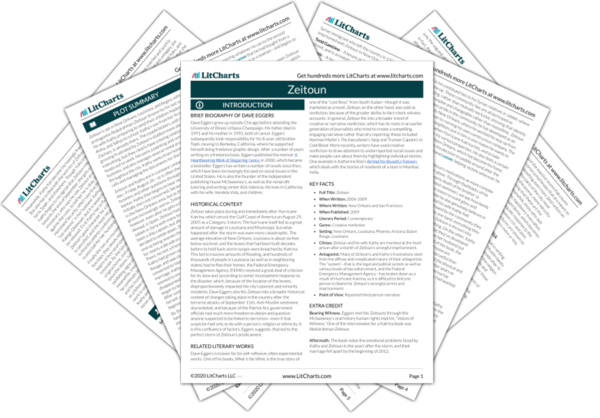Camp Greyhound is the massive temporary prison complex that housed Zeitoun and his three acquaintances, before they were transferred to a state prison. The complex is built in only a couple of days, immediately after the storm. Housed in the train and bus station, it is strikingly efficient—especially compared to the chaos of the rest of the city. In some ways, this efficiency reflects the skewed motives that, Eggers argues, characterized law-enforcement and legal response to the storm—emphasizing security, order, and militarized action rather than search and rescue. Camp Greyhound thus symbolizes both the extraordinarily well-coordinated militarized response to Hurricane Katrina, as well as a deeper malfunction: the breakdown of other systems, like the legal and judicial systems, which are meant to ensure people’s basic human rights, even in times of crisis.
Camp Greyhound Quotes in Zeitoun
When Zeitoun and the others entered the main room of the station, immediately fifty pairs of eyes, those of soldiers and police officers and military personnel, were upon them. There were no other civilians inside. It was as if the entire operation, this bus station-turned-military base, had been arranged for them.

Unlock explanations and citation info for this and every other Zeitoun quote.
Plus so much more...
Get LitCharts A+Who did this work? Were there contractors and laborers working around the clock on a prison days after the hurricane? It was mind-boggling. It was all the more remarkable given that while the construction was taking place, on September 2, 3, and 4, thousands of residents were being plucked from rooftops, were being discovered alive and dead in attics.
The ban on phone calls was, then, purely punitive, just as the pepper-spraying of the child-man had been born of a combination of opportunity, cruelty, ambivalence, and sport. There was no utility in that, just as there was no utility in barring all prisoners from contacting the outside world.












